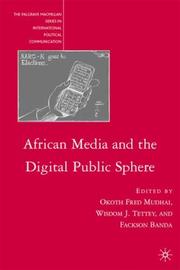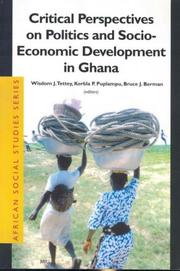| Listing 1 - 7 of 7 |
Sort by
|
Book
Year: 2006 Publisher: Calgary University of Calgary Press
Abstract | Keywords | Export | Availability | Bookmark
 Loading...
Loading...Choose an application
- Reference Manager
- EndNote
- RefWorks (Direct export to RefWorks)
This book addresses the conceptual difficulties and political contestations surrounding the applicability of the term "African-Canadian." In the midst of this contested terrain, the volume focuses on first-generation, black continental Africans who have immigrated to Canada in the last four decades, and have traceable genealogical links to the continent. The rationale behind highlighting the experiences of the first generation of African immigrants within Canadian society is to address the empirical, conceptual, and methodological gaps in the literature that tends to homogenize all black people and their experiences. The book, thus, seeks to highlight the peculiar characteristics of continental Africans which may not be shared by other blacks or non-black Africans. The chapters examine the social constructions of African-Canadians and their experiences within the political and educational systems, as well as in the labour market. They also explore the forms of cooperation and tensions that characterize the communities, and how they negotiate and adapt to the multiple transnational spaces that they occupy. The book also explores the circumstances of their children, as they try to define their identities vis-à-vis their parents and the larger Canadian society.
Black people --- Black people --- Africans --- Africans --- Race identity --- Social conditions --- Canada --- Race identity. --- Canada --- Social conditions.
Book
Year: 2006 Publisher: Calgary University of Calgary Press
Abstract | Keywords | Export | Availability | Bookmark
 Loading...
Loading...Choose an application
- Reference Manager
- EndNote
- RefWorks (Direct export to RefWorks)
This book addresses the conceptual difficulties and political contestations surrounding the applicability of the term "African-Canadian." In the midst of this contested terrain, the volume focuses on first-generation, black continental Africans who have immigrated to Canada in the last four decades, and have traceable genealogical links to the continent. The rationale behind highlighting the experiences of the first generation of African immigrants within Canadian society is to address the empirical, conceptual, and methodological gaps in the literature that tends to homogenize all black people and their experiences. The book, thus, seeks to highlight the peculiar characteristics of continental Africans which may not be shared by other blacks or non-black Africans. The chapters examine the social constructions of African-Canadians and their experiences within the political and educational systems, as well as in the labour market. They also explore the forms of cooperation and tensions that characterize the communities, and how they negotiate and adapt to the multiple transnational spaces that they occupy. The book also explores the circumstances of their children, as they try to define their identities vis-à-vis their parents and the larger Canadian society.
Black people --- Africans --- Race identity --- Social conditions --- Canada --- Race identity. --- Social conditions.
Book
Year: 2006 Publisher: Calgary University of Calgary Press
Abstract | Keywords | Export | Availability | Bookmark
 Loading...
Loading...Choose an application
- Reference Manager
- EndNote
- RefWorks (Direct export to RefWorks)
This book addresses the conceptual difficulties and political contestations surrounding the applicability of the term "African-Canadian." In the midst of this contested terrain, the volume focuses on first-generation, black continental Africans who have immigrated to Canada in the last four decades, and have traceable genealogical links to the continent. The rationale behind highlighting the experiences of the first generation of African immigrants within Canadian society is to address the empirical, conceptual, and methodological gaps in the literature that tends to homogenize all black people and their experiences. The book, thus, seeks to highlight the peculiar characteristics of continental Africans which may not be shared by other blacks or non-black Africans. The chapters examine the social constructions of African-Canadians and their experiences within the political and educational systems, as well as in the labour market. They also explore the forms of cooperation and tensions that characterize the communities, and how they negotiate and adapt to the multiple transnational spaces that they occupy. The book also explores the circumstances of their children, as they try to define their identities vis-à-vis their parents and the larger Canadian society.
Black people --- Black people --- Africans --- Africans --- Race identity --- Social conditions --- Canada --- Race identity. --- Canada --- Social conditions.

ISBN: 9781552381755 1552381757 9786610946556 1280946555 1552382761 1429411678 Year: 2005 Publisher: Calgary, Alta. : University of Calgary Press,
Abstract | Keywords | Export | Availability | Bookmark
 Loading...
Loading...Choose an application
- Reference Manager
- EndNote
- RefWorks (Direct export to RefWorks)
With transnational migration reaching unprecedented levels in Canada, the need for new trajectories of intercultural understanding and minority-relevant policy has never been greater. Through an interdisciplinary approach, these essays provide readings of how the social structures of Canada and of the respective countries of origin -- including their ethnicity, ancestry, and lineage -- interact to shape the identities, expectations, and aspirations of African Canadians.
Blacks --- Immigrants --- Africans --- African diaspora --- Black Canadians --- Noirs --- Africains --- Race identity --- Social conditions --- Identite ethnique --- Conditions sociales --- Canada --- Race relations --- Race identity. --- Social conditions. --- Race relations. --- Blacks - Race identity - Canada --- Blacks - Canada - Social conditions - 20th century --- Immigrants - Canada --- Africans - Canada --- Noirs - Canada - Identite ethnique --- Noirs - Canada - Conditions sociales --- Africains - Canada - Identite ethnique --- Africains - Canada - Conditions sociales --- Canada - Race relations

ISBN: 9780230614864 0230614868 Year: 2009 Publisher: New York, NY : Palgrave Macmillan,
Abstract | Keywords | Export | Availability | Bookmark
 Loading...
Loading...Choose an application
- Reference Manager
- EndNote
- RefWorks (Direct export to RefWorks)
Digital media --- Information society --- Democracy --- Information technology --- Médias numériques --- Société informatisée --- Démocratie --- Technologie de l'information --- Social aspects --- Political aspects --- Aspect social --- Aspect politique

ISBN: 1280466596 9786610466597 1417538953 9047402162 9781417538959 9004130136 9789004130135 Year: 2003 Publisher: Leiden Brill
Abstract | Keywords | Export | Availability | Bookmark
 Loading...
Loading...Choose an application
- Reference Manager
- EndNote
- RefWorks (Direct export to RefWorks)
This volume provides a comprehensive and integrated analysis of Ghanaian politics, economy and society, outlining tensions, dilemmas and prospects that the country has to contend with. The chapters critically examine the performance and prospects of democratic institutions and processes; responses to, and impact of, economic policies and programs; and how culture intersects with the preceding developments to shape socio-economic and political institutions and practices. The collection is divided into four thematic sections: Politics, the State and Democratic Consolidation Economic Crisis and Neo-Liberal Reforms: Responses and Implications Indigenous Institutions and the Shaping of Development Culture, Indigenous Knowledge and Development It combines rich, recent, empirical material with sophisticated theoretical analyses, and brings unique interdisciplinary perspectives to bear on the issues examined.
Democratization --- Indigenous peoples --- Aboriginal peoples --- Aborigines --- Adivasis --- Indigenous populations --- Native peoples --- Native races --- Ethnology --- Democratic consolidation --- Democratic transition --- Political science --- New democracies --- Ghana --- Politics and government --- Economic policy. --- Political systems --- Internal politics --- Economic policy and planning (general) --- Democratization. --- Economic nationalism --- Economic planning --- National planning --- State planning --- Economics --- Planning --- National security --- Social policy
Book

ISBN: 0230607810 Year: 2008 Publisher: New York : Palgrave Macmillan,
Abstract | Keywords | Export | Availability | Bookmark
 Loading...
Loading...Choose an application
- Reference Manager
- EndNote
- RefWorks (Direct export to RefWorks)
Globalization --- Neoliberalism --- Africa --- Economic conditions --- Social conditions
| Listing 1 - 7 of 7 |
Sort by
|

 Search
Search Feedback
Feedback About UniCat
About UniCat  Help
Help News
News